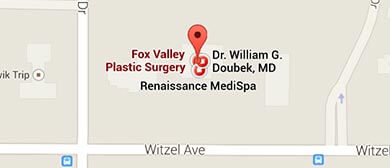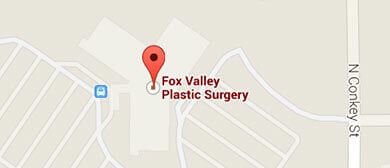
 Fox Valley Plastic Surgery actively partners with general surgeons in the Fox Valley of Wisconsin to provide reconstruction surgery for breast cancer patients. Along with our active cases are past patients spanning over 20 years. Most recover well without any problems, but some patients develop issues years after the initial reconstruction. Some of these patients live with issues, because they were not aware that insurance covered the continued treatment even years after the original breast reconstruction. For instance, if an implant (from breast reconstruction, and not elective breast augmentation) ruptures, insurance covers the replacement of the implant. Breast reconstruction patients should know their rights under the Women’s Health and Cancer Rights Act 1998.
Fox Valley Plastic Surgery actively partners with general surgeons in the Fox Valley of Wisconsin to provide reconstruction surgery for breast cancer patients. Along with our active cases are past patients spanning over 20 years. Most recover well without any problems, but some patients develop issues years after the initial reconstruction. Some of these patients live with issues, because they were not aware that insurance covered the continued treatment even years after the original breast reconstruction. For instance, if an implant (from breast reconstruction, and not elective breast augmentation) ruptures, insurance covers the replacement of the implant. Breast reconstruction patients should know their rights under the Women’s Health and Cancer Rights Act 1998.
WOMEN’S HEALTH AND CANCER RIGHTS ACT
The Women’s Health and Cancer Rights Act (WHCRA) helps protect many women with breast cancer who choose to have their breasts rebuilt (reconstructed) after a mastectomy. Mastectomy is surgery to remove all or part of the breast. This federal law requires most group insurance plans that cover mastectomies to also cover breast reconstruction. The WHCRA applies to group health plans for plan years starting on or after October 1, 1998 as long as the plan covers medical and surgical costs for mastectomy. Under the WHCRA, mastectomy benefits must cover:
- Reconstruction of the breast that was removed by mastectomy surgery and reconstruction of the other breast to make the breasts look symmetrical or balanced after mastectomy
- Any external breast prostheses (breast forms that fit into your bra) that are needed before or during the reconstruction
- Any physical complications at all stages of mastectomy, including lymphedema fluid build-up in the arm and chest on the side of the surgery
Mastectomy benefits may have a yearly deductible and may require that you pay co-insurance. Co-insurance is when less than the full amount of the bill is paid by the insurance company and the patient must pay the difference.
FAQ’s
Does the WHCRA allow insurers to take people off their plans so that they do not have to pay breast reconstruction benefits? No. The WHCRA does not allow insurance plans and insurance companies to kick people out of the plan or keep them from enrolling or renewing their coverage under the plan to avoid WHCRA requirements.
Does the WHCRA let insurance plans give doctors incentives to discourage women from having breast reconstruction after mastectomy? No. The WHCRA does not allow insurance plans and insurance issuers to penalize doctors or lead them to provide care in a way that does not support the WHCRA. Nor does it allow insurance plans to reward doctors who do not encourage their patients to look into breast reconstruction.
Does my insurance provider have to tell me that I am covered for breast reconstruction under the WHRCA? Yes. The law also requires that insurance providers notify you of this coverage when you enroll in their plan, and every year after that.
What if my state has laws that require insurers to cover breast reconstruction? Wisconsin has its own law requiring reimbursement for breast cancer screening and breast reconstruction or prosthesis. This state law only applies to those health plans purchased by an employer from a commercial insurance company. If an employer is self-insured, state laws do not apply, but federal laws do. A self-insured (or self-funded) plan is one in which the employer, rather than a commercial insurance company, pays for the insured person’s health expenses. Some employers that self-insure will hire a commercial insurance company to write the checks and track the paperwork, even though the money for the payments still comes from the employer. So it can be hard to tell whether you are in a self-insured or a commercially insured plan unless you ask. If you are unsure of your plan’s status, ask your employer’s benefits manager. The WHCRA applies to self-insured plans that are not covered by state law, and sets a minimum standard to be sure this service is available for all women in every state. This includes states with weaker or no laws covering breast reconstruction.
I have been diagnosed with breast cancer and plan to have a mastectomy. How will the WHCRA affect my benefits? Under the WHCRA, group health plans, insurance companies, and HMOs that offer mastectomy coverage must also provide coverage for reconstructive surgery after mastectomy. This coverage includes reconstruction of the breast removed by mastectomy, reconstruction of the other breast to give a more balanced look, breast prostheses, and treatment of physical complications at all stages of the mastectomy, including lymphedema. This federal law sets a minimum requirement so that women can have breast reconstruction after mastectomy, even if they live in states that do not make insurance companies provide this coverage.
Does the WHCRA require all group plans, insurance companies, and HMOs to provide reconstructive surgery benefits? In most cases, yes, as long as the insurance plan also covers medical and surgical benefits for mastectomies. But certain church plans and government plans may not be required to pay for reconstructive surgery. If you are insured under a health plan sponsored by a church or local government plan, check with your plan administrator about it.
Under the WHCRA, can insurance providers impose deductibles or co-insurance requirements for reconstructive surgery in connection with a mastectomy? Yes. But the deductibles and co-insurance must be like those that are used for other benefits under the plan or coverage. The company cannot have you paying a higher deductible or co-pay for breast rebuilding than you would pay for other types of surgery.
My state requires the coverage for breast reconstruction that is required by the WHCRA and also requires a minimum hospital stay for my mastectomy. If I have a mastectomy and breast reconstruction, am I also entitled to the minimum hospital stay? It depends. If you have coverage through your employer and your employer is insured, you would be entitled to the minimum hospital stay required by the state law. If you have coverage through your employer but your coverage is not provided by an insurance company or HMO (that is, your employer “self-insures” your coverage), then state law does not apply. In that case, only the federal WHCRA applies and it does not require minimum hospital stays. To find out if your group health plan is insured or self-insured, contact your plan administrator. If you have coverage under a private health insurance policy (not through your employer), check with your State Insurance Commissioner’s office to learn if state law applies.
Are health plans required to give me notice of the WHCRA benefits? Yes. Both health plans and health insurance issuers are required to tell you about WHCRA benefits. They must do this when you enroll and every year after that. The annual notice may be sent by itself or it may be included in almost any written communication by the plan or insurer, such as newsletters, annual reports, policy renewal letters, enrollment notices, and others. Enrollment notices may even be a phone number or web address from which to get more information about coverage.
Does the WHCRA affect the amount that my health plan will pay my doctors? No. The WHCRA does not keep a plan or health insurance issuer from bargaining about amounts and types of payment with doctors. But the law does forbid insurance plans and issuers from penalizing doctors or providing incentives that would cause a doctor to give care that’s not consistent with WHCRA.
Does the new health care law affect the WHCRA? No. The WHCRA was not changed by the Affordable Care Act and there are no provisions or regulations that affect it. Health insurance plans that offer mastectomy must continue to offer breast reconstruction.
Do the WHCRA requirements apply to Medicare or Medicaid? No. The law does not apply to Medicare and Medicaid. Still, Medicare covers breast reconstruction if you had a mastectomy because of breast cancer. Medicaid coverage varies in each state, so you will have to get this information for your state.
Where can I get more information about my rights under the WHCRA? If you have more questions or concerns, you can contact:
- US Department of Labor at 866-487-2365.
- Employee Benefits Security Administration, a special office of the Department of Labor, at 1-866-444-3272 for information about employer-based health insurance
- Your health plan administrator (a number should be listed on your insurance card)
- Wisconsin Office of the Commissioner of Insurance at 800-236-8517


Oshkosh, WI (920) 233-1540